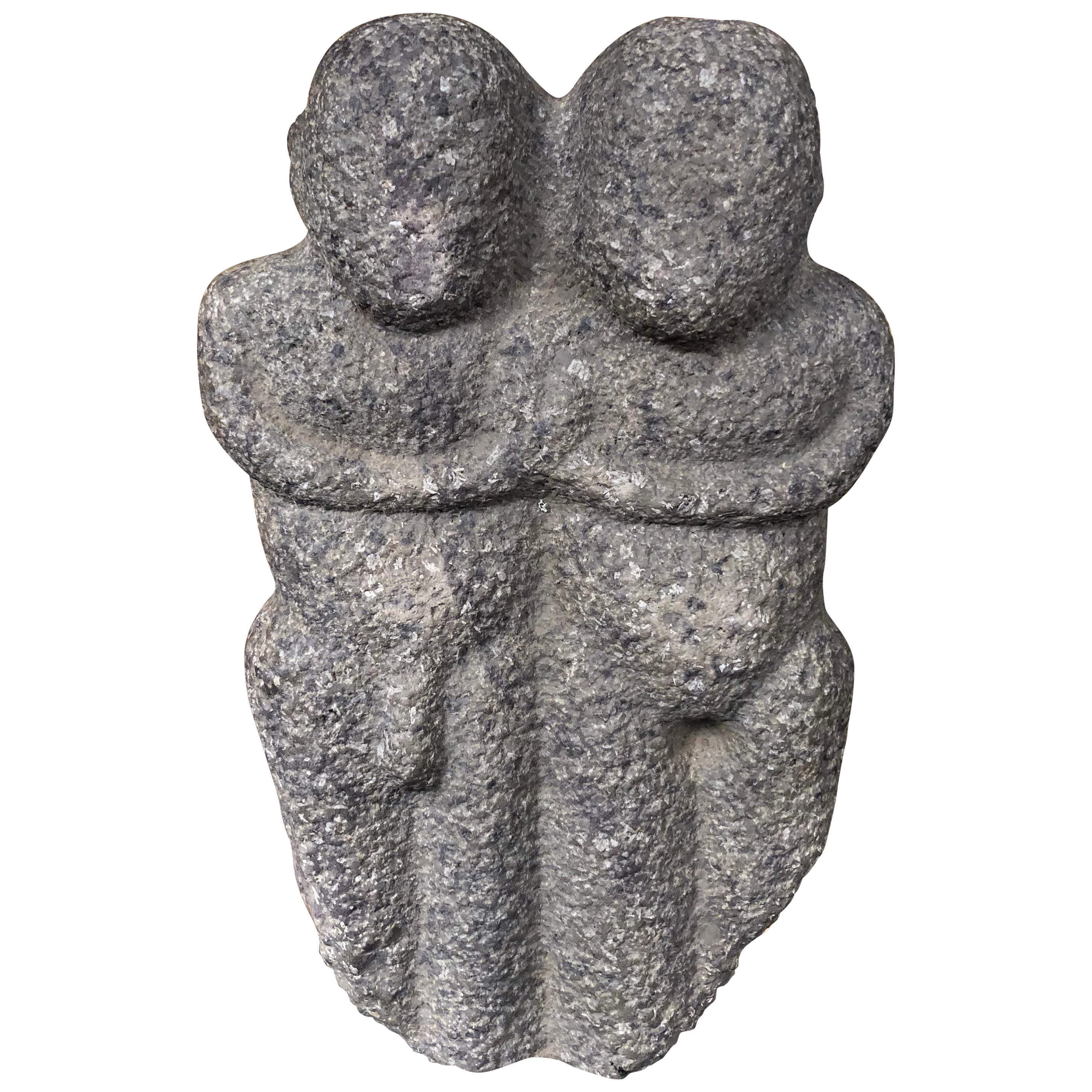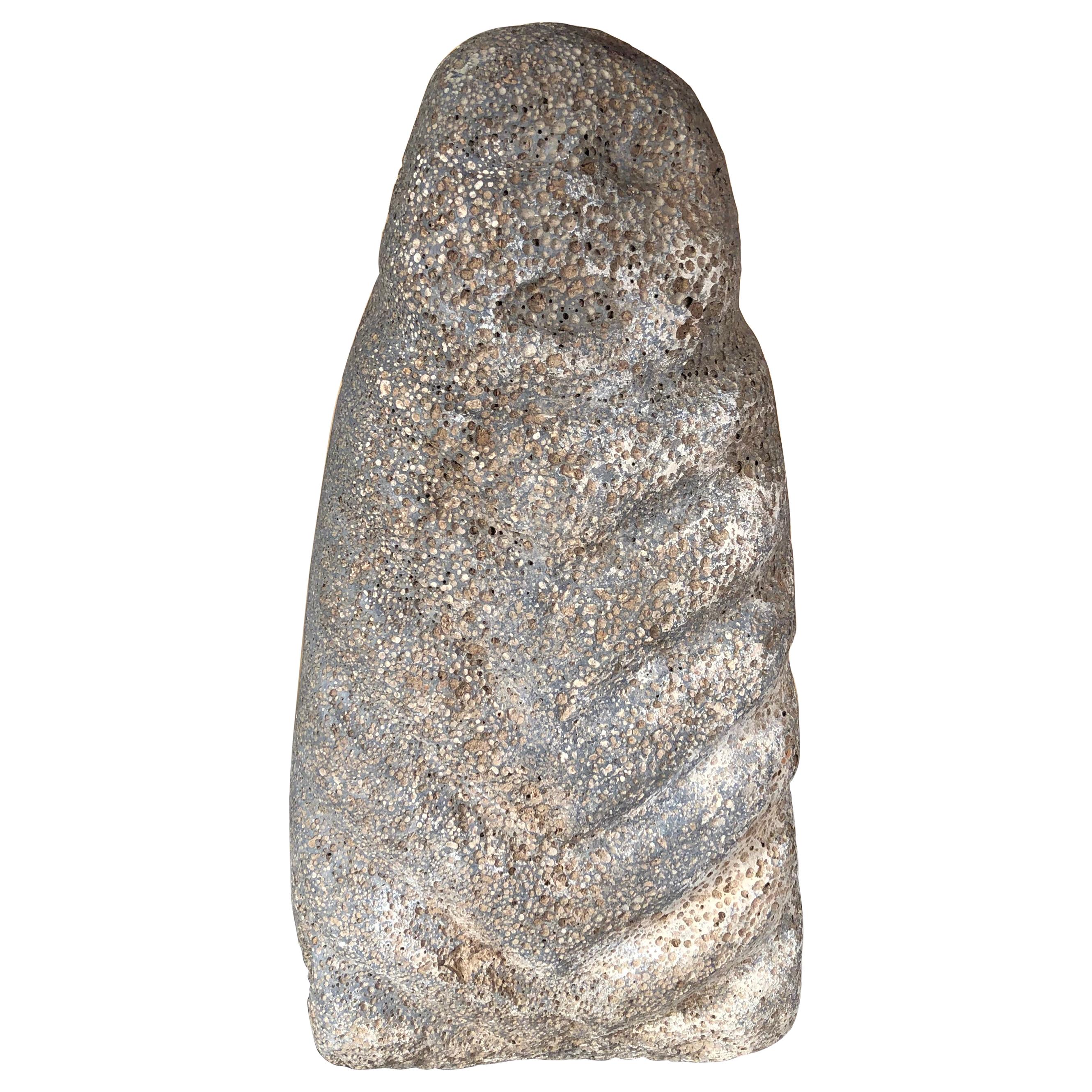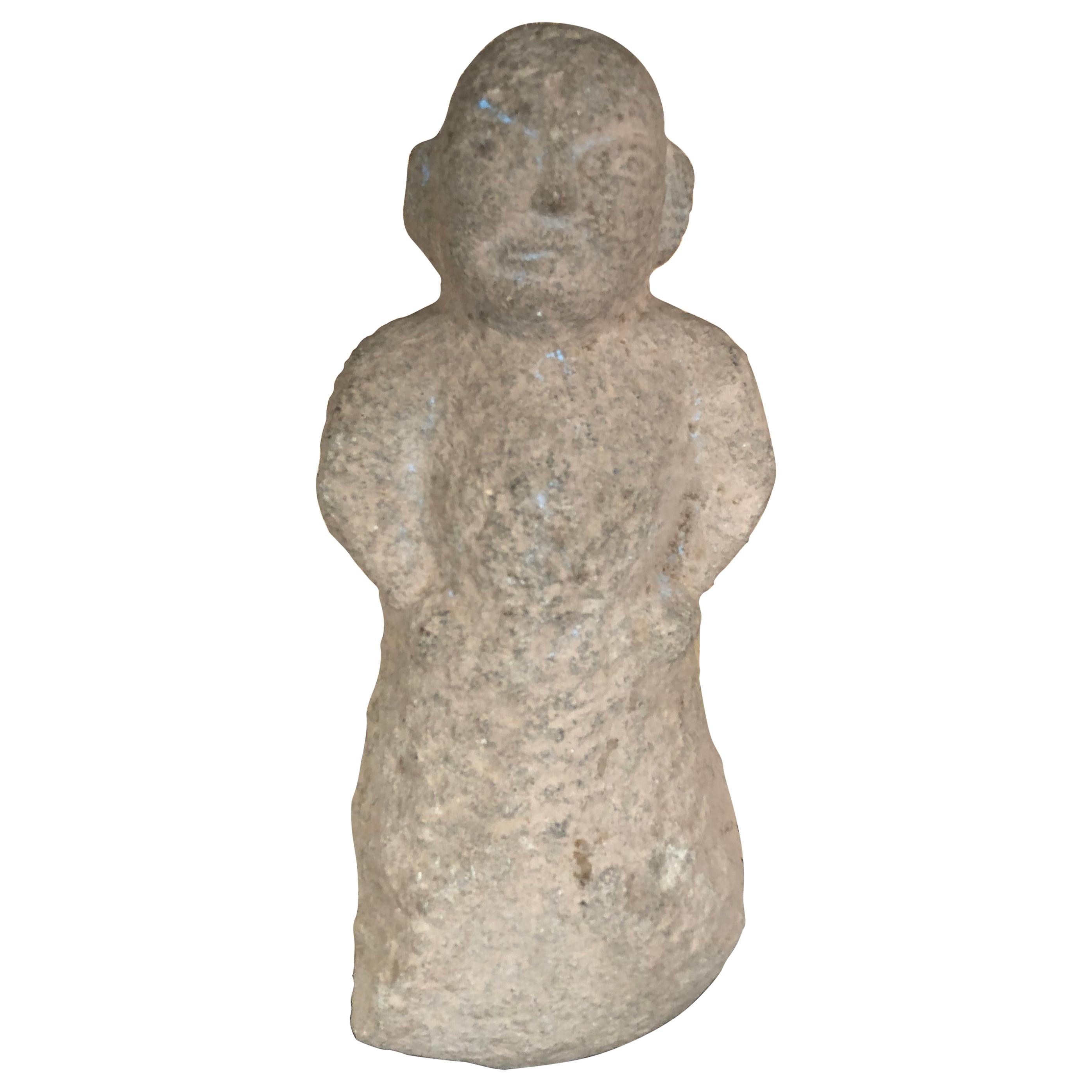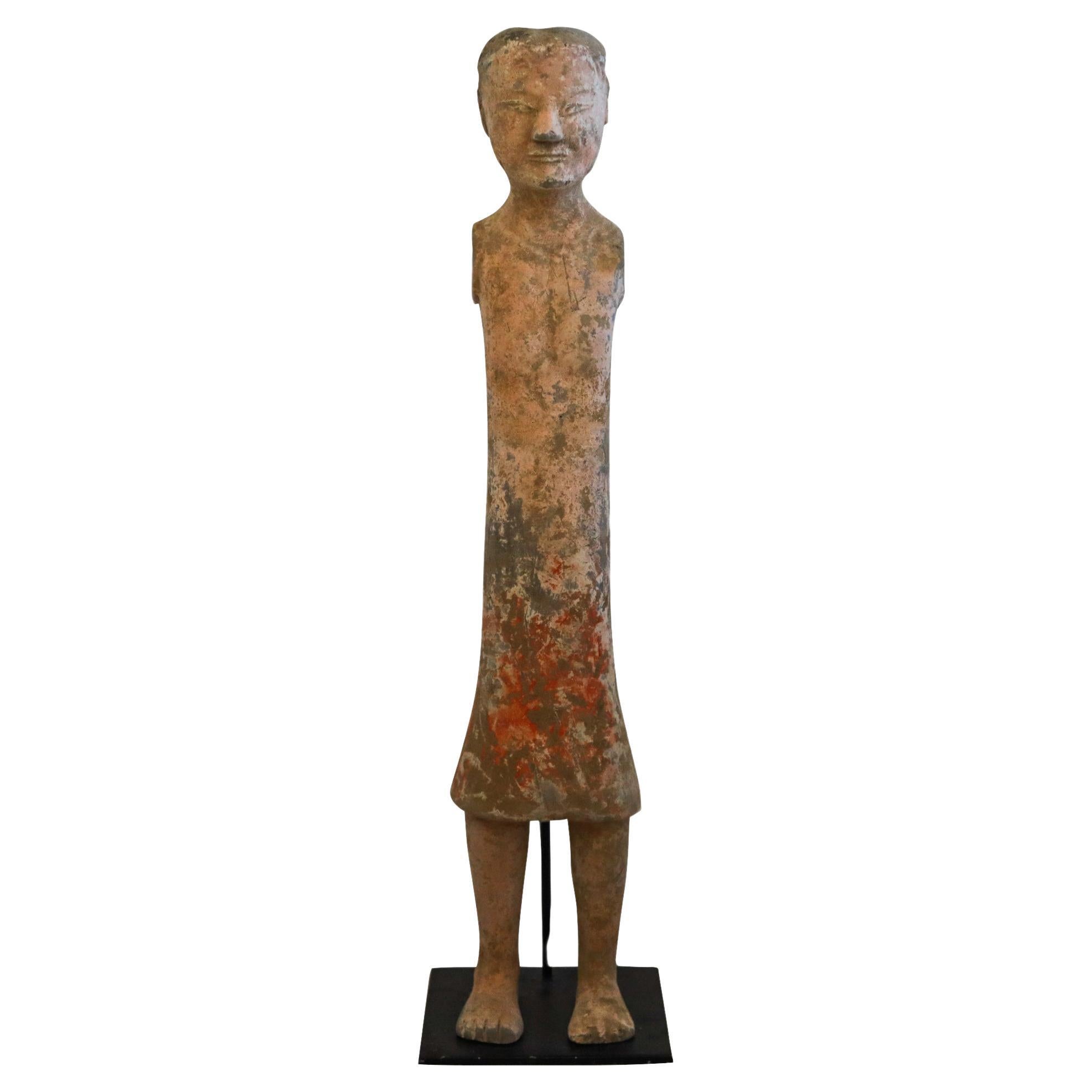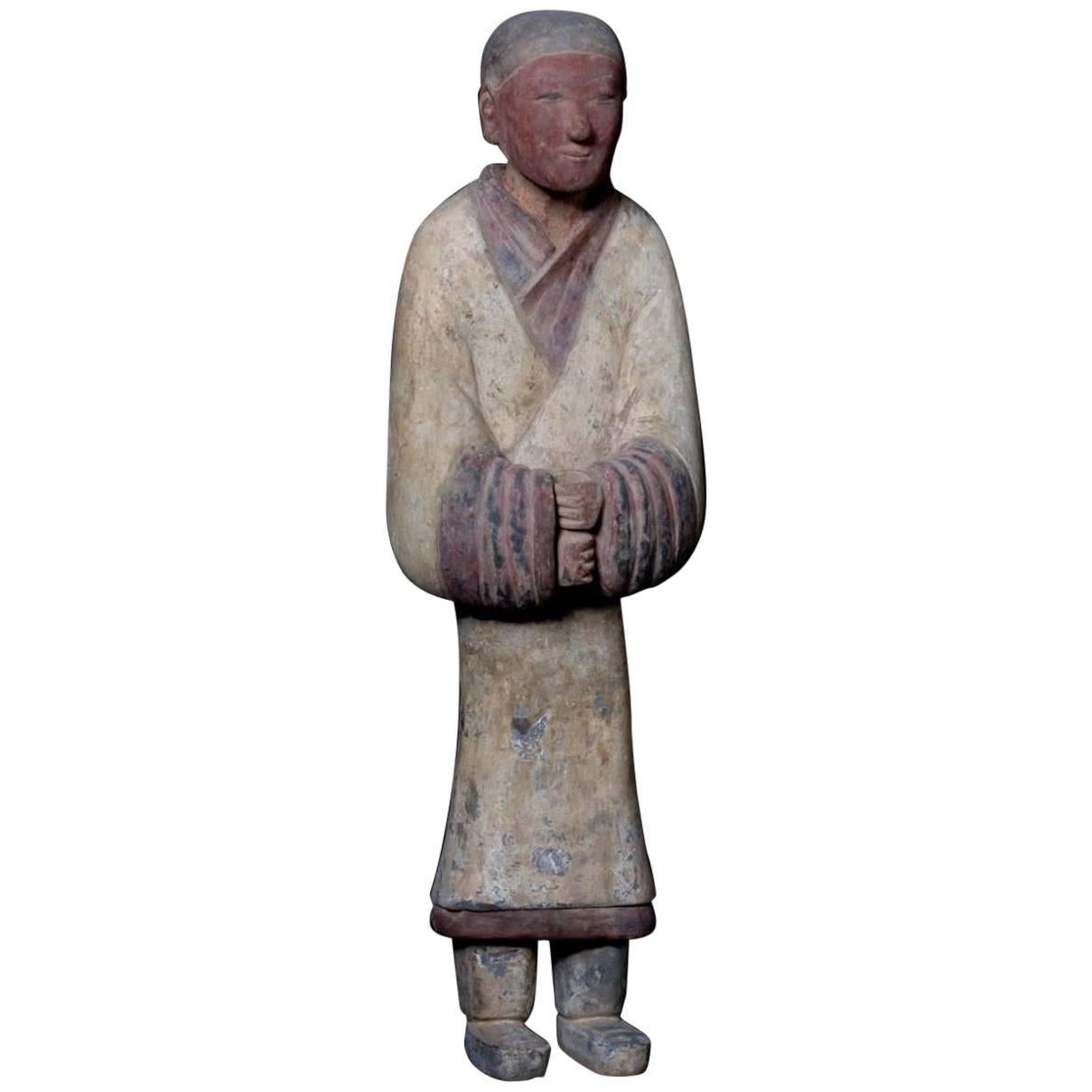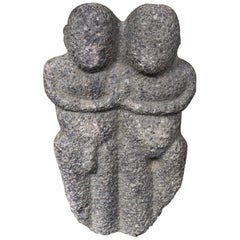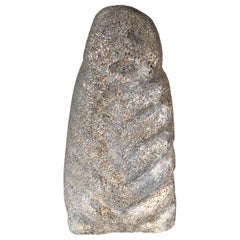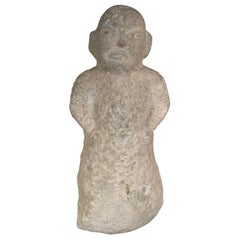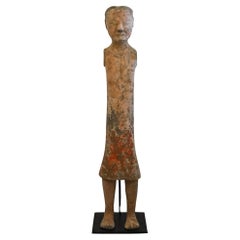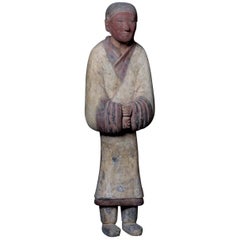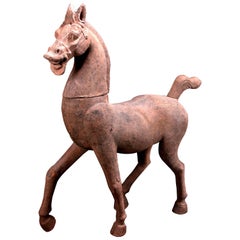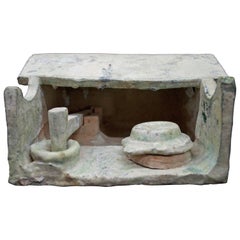Items Similar to Chinese Stone Fertility Sculpture, 4700-2900 BC
Want more images or videos?
Request additional images or videos from the seller
1 of 16
Chinese Stone Fertility Sculpture, 4700-2900 BC
About the Item
China, a fine archaic male effigy hand carved from a granular medium to dark gray stone. Neolithic period, Hongshan culture (circa 4700-2900 BC)
Likely a fertility fetish. Note the pecked surfaces and the stone carved hair line top knot.
Quality: Fine original condition, no repairs, as collected. Dark varied patina from appropriate age.
Dimensions: 13.5 inches tall and 6 inches width.
About Hongshan Culture:
The Hongshan culture was a Neolithic culture in northeastern China. Hongshan sites have been found in an area stretching from Inner Mongolia to Liaoning, and dated from about 4700-2900 BC. The culture is named after Hongshanhou, a site in Hongshan District, Chifeng. The Hongshanhou site was discovered by the Japanese archaeologist Torii Ryuzo in 1908 and extensively excavated in 1935 by Kosaku Hamada and Mizuno Seiichi.
Provenance:
Our private collection and accompanied by our Lifetime Guarantee of Authenticity. Originally collected in the area of Chifeng City, Inner Mongolia.
In addition, our Hongshan stone effigy has been examined and authenticated by Mr. Gu Fang, Senior Fellow at the Center of Jadeology and Jade Culture in Beijing (CASS).
Our gallery has been dealing in authentic Chinese antiquities, Japanese, and Fine Asian art, garden ornaments, lanterns and water basins for 25 years. Our president personally travels to China, Japan and Europe each year to meet his network partners who assist him in finding best examples. He personally inspects each antique work of art to ensure its old age, authenticity and quality condition.
- Dimensions:Height: 13.5 in (34.29 cm)Width: 6 in (15.24 cm)Depth: 4 in (10.16 cm)
- Materials and Techniques:
- Place of Origin:
- Period:
- Date of Manufacture:4700-2900 BC
- Condition:Wear consistent with age and use.
- Seller Location:South Burlington, VT
- Reference Number:1stDibs: LU1289218677382
About the Seller
5.0
Platinum Seller
Premium sellers with a 4.7+ rating and 24-hour response times
Established in 1990
1stDibs seller since 2015
2,363 sales on 1stDibs
Typical response time: 1 hour
- ShippingRetrieving quote...Shipping from: South Burlington, VT
- Return Policy
Authenticity Guarantee
In the unlikely event there’s an issue with an item’s authenticity, contact us within 1 year for a full refund. DetailsMoney-Back Guarantee
If your item is not as described, is damaged in transit, or does not arrive, contact us within 7 days for a full refund. Details24-Hour Cancellation
You have a 24-hour grace period in which to reconsider your purchase, with no questions asked.Vetted Professional Sellers
Our world-class sellers must adhere to strict standards for service and quality, maintaining the integrity of our listings.Price-Match Guarantee
If you find that a seller listed the same item for a lower price elsewhere, we’ll match it.Trusted Global Delivery
Our best-in-class carrier network provides specialized shipping options worldwide, including custom delivery.More From This Seller
View AllChinese Ancient Hongshan Culture Pregnant Female Fertility Sculpture 4700-2900BC
Located in South Burlington, VT
China, a fine archaic conjoined bust sculpture of a male and female hand carved from a granular medium to dark gray stone. Neolithic period, Hongshan culture (circa 4700-2900 BC)
Likely a fertility - progeny sculpture. Please note the pecked surfaces and the stone carved hair line particularly on the back head area.
Quality: Fine original condition, no repairs, as collected. Dark varied patina from appropriate age.
This is likely a unique carving.
Dimensions: 12.25 inches tall and 4.25 inches width.
About Hongshan Culture:
The Hongshan culture was a Neolithic culture in northeastern China. Hongshan sites have been found in an area stretching from Inner Mongolia to Liaoning, and dated from about 4700-2900 BC. The culture is named after Hongshanhou, a site in Hongshan District, Chifeng. The Hongshanhou site was discovered by the Japanese archaeologist Torii Ryuzo in 1908 and extensively excavated in 1935 by Kosaku Hamada and Mizuno Seiichi.
Provenance:
Our private collection and accompanied by our Lifetime Guarantee of Authenticity. Originally collected in the area of Chifeng City, Inner Mongolia.
In addition, our Hongshan stone effigy...
Category
Antique 15th Century and Earlier Chinese Antiquities
Materials
Stone
Chinese Ancient Hongshan Culture Stone Sculpture, 4700-2900 BC
Located in South Burlington, VT
China, a fine archaic human effigy hand-carved from a granular medium to dark gray volcanic stone with six (6) "V" sections carved front. Neolithic period, Hongshan culture...
Category
Antique 15th Century and Earlier Chinese Antiquities
Materials
Stone
Chinese Ancient Stone Male Figure, 206 BC-220 AD
Located in South Burlington, VT
China, a rare hand carved stone male figure from the Han dynasty (206 BCE-220 CE).
Dimensions: 16 inches tall on its custom stand and and 6 inches wide
Condition: old patina wi...
Category
Antique 15th Century and Earlier Chinese Han Sculptures and Carvings
Materials
Stone
$2,800 Sale Price
27% Off
Ancient China Monumental Stone Ram Han Dynasty, 206BC-220AD
Located in South Burlington, VT
China, a large votive model of a stone ram, Han dynasty (206BC-220AD)
Dimensions: 45cm, 18 inches high and 65cm, 26 inches length and 25cm, 10 inches wi...
Category
Antique 15th Century and Earlier Chinese Han Sculptures and Carvings
Materials
Limestone
$28,000 Sale Price
27% Off
Important Chinese Ancient Bronze Money Tree, 25BC-220AD
Located in South Burlington, VT
China, Ancient Bronze “Money Tree” Yaoqian Shu with original pottery base, Han dynasty (25 BCE – 220 CE)
Dimensions: 155cm, 62 inches high
A sculpted terracotta pottery base in the form of a tortoise with attendants and inserted with five individual bronze pole segments with twenty four individual hanging bronze open work money “branches” attached in tiers, four per tier and topped with a figure of a bronze phoenix as apex most bearing varying degrees of malachite and azurite encrustation from ancient burial.
Important Description Details:
Pottery "tortoise" base: 14.5" high and 11" wide
Bronze sections:
7pcs pole bronze sections approximately 8" length each
1pc top "phoenix" bronze section approximately 7" high and 6" wide
20 pcs long bronze hanging wings approximately 10" long and 5" wide each
4 pcs short bronze hanging wings (near top) approximately 7" long and 4" wide each
Total 32 pcs with ancient green and blue azurite patina.
Catalog reference: Schneible Fine arts catalog - 35 Years Collecting Treasures- Number 11p. 28 (see photos)
Provenance: Provenance: Private family collection formerly exhibited “Asia Week” New York City, Fuller Building, Zabriskie Gallery, 2008.
History of money trees:
In the late Han Dynasty tombs...
Category
Antique 15th Century and Earlier Chinese Han Antiquities
Materials
Bronze
China Ancient Stone Entertainer, Han Dynasty 200 AD
Located in South Burlington, VT
China an ancient limestone figure of an Entertainer replete with hands holding tambourines and a top a drum, -for the afterlife- , Han dynasty 206 BC...
Category
Antique 15th Century and Earlier Chinese Han Sculptures and Carvings
Materials
Limestone
$12,000 Sale Price
20% Off
You May Also Like
China 100 BC Han Dynasty Ancient Rare Stickman Sculpture in Earthenware Pottery
Located in Miami, FL
Standing Stickman from the Han Dynasty.
Original ancient Chinese tomb attendants sculpture of a tall, thin standing man wearing a short tunic. Beautifully crafted in grey earthenw...
Category
Antique 15th Century and Earlier Chinese Han Antiquities
Materials
Iron
Elegant Han Dynasty Terracotta Warrior - China '206 BC - 220 AD'
Located in San Pedro Garza Garcia, Nuevo Leon
Impressive terracotta warrior representing a banner bearer gripping a wooden staff with his hands (dematerialized through the ages); his gaze is ser...
Category
Antique 15th Century and Earlier Chinese Han Antiquities
Materials
Terracotta
Monumental Han Dynasty Terracotta Horse - TL Tested - China, '206 BC–220 AD'
Located in San Pedro Garza Garcia, Nuevo Leon
A massive pottery horse with separately made head and tail, standing on all fours and striding with its right hoof forward. Extended snout ends in parted lips showing teeth beneath i...
Category
Antique 15th Century and Earlier Chinese Han Antiquities
Materials
Terracotta
Eastern Han Dynasty Terracotta Barn Workshop, China '206BC - 220AD' Ex-Museum
Located in San Pedro Garza Garcia, Nuevo Leon
Slab pottery constructed barn workshop having a peaked roof – open walled form with a mechanical pounder and a large round covered storage container. Light blue-green mottled glazed surface with some iridescence patina to the glaze.
Condition: Intact, excellent condition, an unusual example.
Provenance: The Living Torah Museum, Brooklyn; ex. Sands of Time, 2002.
Sculptural effigies of domesticated animals were often interred in the tombs of nobility and elite members of the social hierarchy. Models like this one were made to represent everything from simple goat or pig pens to the most elaborate towers and palaces. Because very few ancient Chinese buildings have survived intact, these models, along with descriptions from ancient texts, give a good representation of what the buildings might have looked like.
This fantastic piece is accompanied by a Certificate of Authenticity.
Burial figurines of graceful dancers, mystical beasts, and everyday objects reveal both how people in early China approached death and how they lived. Since people viewed the afterlife as an extension of worldly life, these figurines, called mingqi, sometimes referred as “spirit utensils” or “vessels of ghosts” disclose details of routine existence and provide insights into belief systems over a thousand-year period. For the first time in Chinese history, we have images of rural and daily life during the Han in the form of contemporary...
Category
Antique 15th Century and Earlier Chinese Han Antiquities
Materials
Terracotta
Eastern Han Dynasty Terracotta Model of a Paper Mill , China '206BC - 220AD'
Located in San Pedro Garza Garcia, Nuevo Leon
Slab pottery constructed Model of a Paper Mill, in Green and Cream Color Glazed Terracotta having a peaked roof – open walled form with a mechanical pounder and a large round storage container. Light blue-green mottled glazed surface with some iridescence patina to the glaze. The Iridescence is a refraction of the layers on the glass that produces multicolor hues & metallic luster, and only develops after one thousand years of being buried in the ground. An unquestionable mark of antiquity, impossible to falsify.
Han Dynasty, dated 206 B.C-220 A.D.
Condition: Excellent, wear commensurate with age, an unusual example.
This fantastic piece is accompanied by a Certificate of Authenticity.
Sculptural effigies of domesticated animals were often interred in the tombs of nobility and elite members of the social hierarchy. Models like this one were made to represent everything from simple goat or pig pens to the most elaborate towers and palaces. Because very few ancient Chinese buildings have survived intact, these models, along with descriptions from ancient texts, give a good representation of what the buildings might have looked like.
Burial figurines of graceful dancers, mystical beasts, and everyday objects reveal both how people in early China approached death and how they lived. Since people viewed the afterlife as an extension of worldly life, these figurines, called mingqi, sometimes referred as “spirit utensils” or “vessels of ghosts” disclose details of routine existence and provide insights into belief systems over a thousand-year period. For the first time in Chinese history, we have images of rural and daily life during the Han in the form of contemporary records...
Category
Antique 15th Century and Earlier Chinese Han Antiquities
Materials
Terracotta
Three Ancient Terracotta Sculptures, China Ming Period
Located in Roma, IT
This Chinese terracotta group of figures is made up of three figures of Chinese dignitaries in glazed green and ocher terracotta on hexagonal bases and removable heads.
From the d...
Category
Antique 16th Century Chinese Sculptures and Carvings
Materials
Terracotta
Recently Viewed
View AllMore Ways To Browse
Chinese Stone
Chinese Stone Art
Bc Art
Antique Stone China
Maling China
Chinese Hair
Chinese Jade Stone
Antique Japanese Stone
Antique Chinese Ornaments
Male Fertility
Japanese Garden Stone
Stones For Japanese Garden
Antique Stone Basin
Carved Fertility
Japanese Stone Sculpture
Mongolia Antique
Stone Garden Japanese
Japanese Jade
